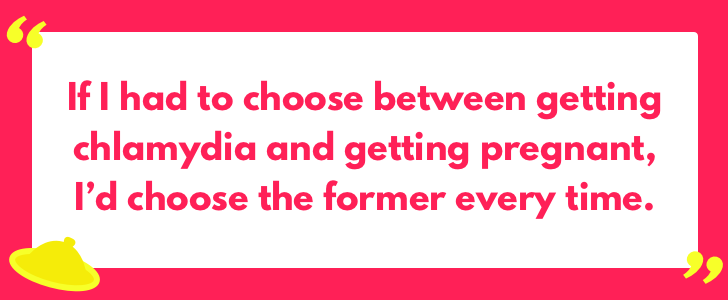The Weird Reason Men Are More Likely to Use Condoms
Studies show men are more likely to use condoms than women. What’s up with that?
My mismatched socks were the last item of clothing he tore off my body. “Wanna get a condom?” I whispered in his ear. The lava lamp illuminated the room enough to search for a rubber inside his cluttered nightstand, but he couldn’t find one.
“You’re on the pill, right?” Julian asked hopefully.
“Duh,” I assured him.
I wondered why he didn’t ask to do it raw earlier. We’d been hooking up exclusively for a few weeks, and I was on birth control. Even though I’d never had sex without a condom, I knew that it would feel better for Julian without a plastic band in the mix.
“Wearing a condom is like a dulled sensation,” my friend with a penis told me. “It’s like wearing a glove and touching a rug; you can feel the texture of it, but it’s not as soft.”
So, nu? Why were we still using rubbers?
Apparently, the stereotype that guys hate wearing condoms doesn’t actually correlate with their behavior. Approximately 58 percent of women reported using condoms during their last 10 hookups, compared to 79 percent of men, according to BirthControl.com.
Surprised and confused by this statistic, I went straight to the source and sought an explanation from my other penis friends. If condoms create a “dulled sensation” for guys, why are they more likely to whip them out than girls?
“It’s a male product,” my friend Hercules Simonson said, leaving his work cubicle to help me solve the condom mystery. “Both people should be prepared, but I’m usually the one who brings the condom because it’s something I put on.”
Okay, so maybe that makes some sense. I don’t expect guys to keep a stash of tampons at their place, but then again, it takes two to missionary and one to menstruate. But labeling condoms as a “male product” can’t be the sole explanation for the 21 percent statistical difference. There had to be something else.
About a week after I said the Shehecheyanu, the blessing Jews say to celebrate special occasions, like having sex without a condom for the first time, I got a call from my lover. He tested positive for chlamydia, and I joined the not-so-exclusive group of one in four young adults between the ages of 15–24 to have an STI. F*ck.
All I could think about was that scene in Mean Girls when Coach Carr lectures about the dangers of unprotected sex. He said that teens develop lots of urges, like taking off their clothes and touching each other. “If you do touch each other, you’ll get chlamydia and die,” he said. Turns out that last part isn’t true, you just have to pop a pill and abstain from sex for a week.
In the heat of the moment, there was only one factor that would determine whether Julian would enter me without a condom or end the night with a cold shower — birth control. He didn’t ask if I was “clean,” he asked if I was “on the pill.”
“I’m more concerned about the 18-year commitment of getting someone pregnant than something that flares up every few months,” confessed Richard Courage, another penis friend.
Based on that, I hypothesized that women who are on the pill are less likely to use condoms than men because they’re not worried about pregnancy. Pouring over my pool of data, I connected the dots that revealed an explanation behind the condom discrepancy. But, I’m not happy about it. Here’s why:
Since 2012, 62 percent of women are on some method of birth control, according to a Center for Disease Control and Prevention survey. Yay!
Since 2013, another CDC survey showed the rate of unintended pregnancies in the United States fell from 51 percent to 45 percent. Yay!
Since 2014, there’s been a six percent increase in cases of chlamydia and a 13 percent increase in cases of gonorrhea, according to a 2016 CDC report. Boo!
Condoms are the only method of birth control that also prevents STIs, but the data indicates they’re primarily used to avoid pregnancy. “I usually ask them right as we’re about to have sex if they’re on the pill,” Simonson said, supporting this notion. “That’s the deciding factor if I put on a condom.”
One guy I talked to was overly optimistic that if someone he was about to have sex with had an STI, she would tell him. “I don’t wanna live in a world where people wouldn’t tell me if they had something,” he said. Unlike Simonson, this guy always uses a condom when having sex with new people, but not because he’s worried about getting infected.
Getting rid of an unwanted pregnancy is indisputably more physically, emotionally and financially taxing than curing most STIs. Ironically, the ease at which we can cure them is making us more susceptible to the infections.Even when we are infected, it’s easier to ignore because the symptoms aren’t always visible. It’s no wonder why gonorrhea and chlamydia are nicknamed “silent STIs.”
Julian didn’t know who he got chlamydia from, but it took a few months before he recognized funky symptoms in his junk. Luckily for him, chlamydia doesn’t lead to permanent damage in male bodied individuals. When he broke the news to me I immediately made an appointment at the Indiana University health center to get treated. I hadn’t experienced any symptoms, but I wanted to nip it in the bud. Unlike for males, untreated chlamydia can permanently damage the female reproductive system.
If I had to choose between getting chlamydia and getting pregnant, I’d choose the former every time. But, no one’s been faced with that dilemma since the roaring ’20s brought latex condoms to the market (shout out Charles Goodyear and Julius Fromm).
Ladies: I implore you to stock up on condoms. Just because it’s a “male product” doesn’t mean men are responsible for supplying them. If it’s too nerve-wracking to buy condoms in public, order a bulk of 100 condoms from Amazon $69.99 — heh.
Don’t know which condom to use? Courage says his favorite is “one that’s readily available.” Unbound also has an excellent assortment in their Condom Box. Grab some rubbers and get freaky with your partner, ’cause nothing is sexier than safe sex. Except for Zac Efron, who also uses condoms.
Image editing and illustrations by Mia Davis



Modern sex essentials
Related reading
Check out the pod
Plant-based, Science-backed Supplements
use code TABU for 20% off
This article may contain affiliate links. Meaning? If you click one and make a purchase, we earn a commission. This helps us keep creating fire content so you can stay informed and empowered. 🔥 Thank you!














New to sexting? Here’s what you need to know to keep it spicy, flirty, and absolutely irresistible (in a way that feels natural to you)